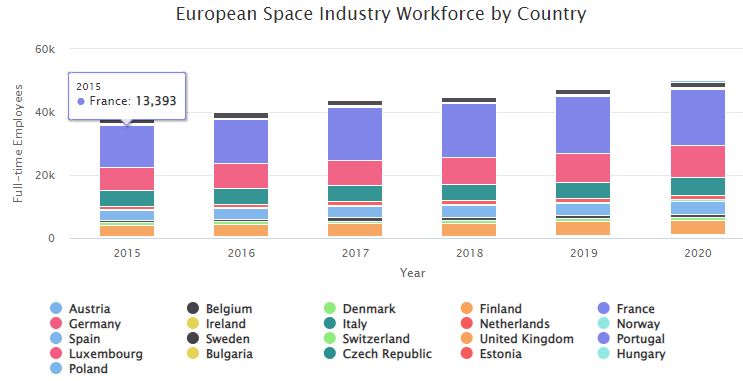Sweden
2016 – Sounding Rockets – Snapshot
Government sounding rocket programs, such as NASA’s Sounding Rockets Program Office (SRPO), use sounding rockets as training tools for future engineers and scientists. More launch opportunities…
European Space Industry Workforce by Country 2000 – 2020


Stacked bar chart showing a twenty-year look at the European space industry workforce by country 2000 – 2020
2015 – Sounding Rockets – Snapshot
NASA’s Sounding Rockets Program Office (SRPO) launches sounding rockets from locations such as Andøya, Norway; Esrange, Sweden; Kwajalein Atoll, Marshall Islands; Poker Flats, Alaska; White Sands, New Mexico; and Wallops Island, Virginia. The suborbital nature of the sounding rockets makes them ideal platforms to conduct short near-Earth space science, astrophysics, and heliophysics experiments, as well as for testing new sensors and other burgeoning space technologies. SRPO arranges workshops with primary and secondary school teachers and provides internships to university students to familiarize them with engineering and science disciplines.
Underwear Shields Bodies Using Space Technology
Some garment makers, such as Björn Borg, are attempting to address a very real need for heat resistance in underclothes. Working with materials used to protect astronauts, garment manufacturers are heeding the wishes of Swedish steelworkers, a demographic working in very heated conditions, and coming up with cool solutions.
2012 – Spaceports as an Economic Engine
NASA’s Kennedy Space Center (KSC), the United States’ primary civil spaceport, marked its 50th anniversary in July 2012. The milestone coincides with the retirement of NASA’s Space Shuttle fleet and related changes in the U.S. human spaceflight program, causing uncertainty in the future utilization … Thank you for visiting The Space Report! The Authoritative Guide…
Miniaturized Dental X-ray Camera
Dentists will soon be able to use a new dental instrument: a tiny, high-resolution X-ray camera that is thinner and smaller than current X-ray machines, minimizing patient discomfort. This tiny X-ray camera was built by a Swedish company, Nanospace, drawing on the same techniques that are used to build micro-propulsion systems for satellites.
2010 – European Space Industry Employment – Snapshot
he number of European space workers counted has expanded by 20% over five years, from 28,584 full-time equivalent (FTE) employees at the end of 2005 to 34,334 FTE employees in 2010. While some of the changes in European space workforce by sector reflected in Exhibit 4l are attributable to Eurospace methodology changes, they also underscore the shifting composition of the European space workforce.
2010 – Bigelow Space Stations – Snapshot
Bigelow Aerospace has been working for several years to develop commercial orbital habitats using expandable modules. This approach, leveraging technology licensed from NASA, involves launching modules in a compact form and inflating them once in orbit, creating much larger volumes than would be possible with traditional metallic structures.
2009 – Ground Networks – Snapshot
Ground stations are an essential but often overlooked segment of space infrastructure. Ground stations connect satellites to terrestrial networks and collect satellite information ranging from tracking and telemetry to imagery and scientific data. The stations also upload information to spacecraft, including command and control data, software upgrades, and other mission-critical instructions. Employees at some ground stations process, analyze, and distribute satellite-based data, products, and services.
2008 – Cosmic Discovery: A Look Ahead
Two competing influences shape the near-term prospects of space astronomy: the burgeoning worldwide development of astronomical technology and human talent, and the decrease in governmental support for basic science brought on by economic and fiscal pressures. Probably the most significant event in … Thank you for visiting The Space Report! The Authoritative Guide to Global…
- « Previous
- 1
- 2
- 3
- Next »